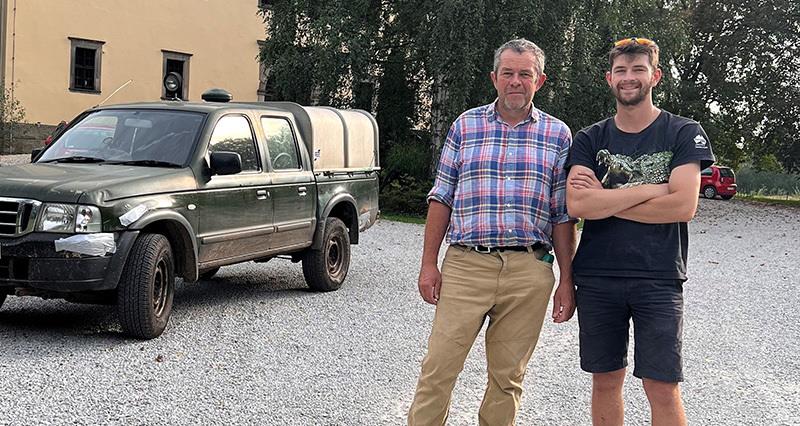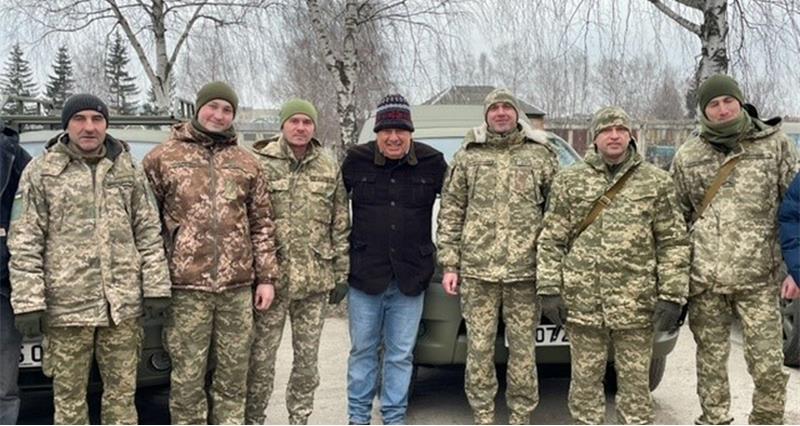IŌĆÖm fortunate to live in a large farmhouse in Sussex, with children weaned off to university. When I saw the images of women and children fleeing the invasion of Ukraine in February 2022, I decided to open my home in response to their plight.
I am offering sanctuary to nine Ukrainians, including one boy whom IŌĆÖve fostered. I first became aware of the charity in Farmers Weekly and I instantly thought it would be a perfect conduit for me to make a tangible difference.
The charity is fronted by Mark Laird, a Scottish farmer with a history of cropping in Poland and Ukraine. From the moment I first contacted P4P, they took me under their wing. I cannot praise their organisational skills highly enough. Mark is a humble man with a passion to support his Ukrainian farming community and his ethos is infectious, with many people having made the journey several times.
The journey to Lviv
It demonstrates incredible generosity from not just farmers. There were ex-military, photographers, journalists, financiers, vets, engineers even a retired submarine commander making the journey. IŌĆÖm sure IŌĆÖm not the only farmer who enjoys a long distance road trip.
Mile upon mile of ever changing landscape dominated by farming scenes, a busmanŌĆÖs holiday that usually has the kids moaning ŌĆśare we there yet?ŌĆÖ From door to door from my Sussex farm to the stunningly authentic city of Lviv in Ukraine is 1,225 miles.
ŌĆ£Pickups are vital tools, they can cross the farmed landscape quickly and they are adaptable.ŌĆØ
NFU Chichester member James Baird
If driven in one hit, it would be 22 hours of driving. From all corners of the UK, we grouped up in Poland before crossing over into Ukraine. ItŌĆÖs impossible to ignore that we were crossing into a warzone, thereŌĆÖs a risk, but an incredibly well managed risk with safeguards in place.
None of us had cold feet. We were immediately met at the border by the warmest of smiles from Union Jack waving villagers.
We entered the city of Lviv in the late afternoon, in a triumphant convoy with blue lights and sirens front and back. Pedestrians stopped and stared and smiled as we careered over slippery cobbles through rush hour traffic.
As a farmer, IŌĆÖm well accustomed to escorting wide loads. For many in our group this was their first taste of being the priority vehicle for which all others must give way, including jumping every red light, trams pulling on their brakes and cars halting as we had been given strict instructions to ŌĆśhug the tailgate in front of usŌĆÖ and ŌĆśkeep in convoy, give way to no oneŌĆÖ.
We were expertly guided to a safe compound and, as we climbed out of our seats, it became clear my own adrenalin rush was common to everyone. WeŌĆÖd made it. There were hugs and high fives, such a buzz of excitement and relief that our faithful pickups hadnŌĆÖt let us down.

Photograph: A sense of relief after arriving in Lviv
We headed to our hotel on foot and thatŌĆÖs when it struck me. During the grand entry IŌĆÖd been staring intently at the vehicle in front and had completely overlooked the historical beauty of the city, moulded by centuries of conflicting governance toing and froing between Vikings to Austrians, Germany, Poland, Russia and now in the custodianship of the proud people of Ukraine.
With more than a millennium of history as a settlement, and over seven centuries as a city, itŌĆÖs no wonder that so many nations have fought to hold this hallowed place of such striking architecture. Back at the hotel, as the bar filled to a raucous chatter that grew as the hospitality flowed, we were made so welcome and, with 35 vehicles, all with co-pilots, we had nearly 70 like-minded comrades to get to know.
The excitement of our grand entrance endured into the evening, right up to our heads finally hitting the pillows before the midnight curfew. The next morning we were treated to a city tour, so well organised with minibuses and a guide who was the most over-qualified person IŌĆÖve ever met. A Ukrainian academic proficient at every period of history, as he flashed through centuries of oppression and injustice pennies were dropping among us just how the past has forged the present day nation into such a formidable and proud people.
Ukrainian identity is the antipathy of struggle. We were taken to the Field of Mars at the Lychakiv Cemetery. Our high spirits from the night before came suddenly down to earth as we strolled respectfully along the central path. A steady stream of wives and mothers came from the city to tend their fallen heroesŌĆÖ last resting place, from combatants killed that week to the next grave already open for inevitable casualties to come.
Passing through the sea of red, black, yellow and blue flags had a profound effect upon all of us as we shared the grief of the nation and we paid our respects.
This was the moment that I really understood the importance of the P4P charity. Here was a field of snuffed out hope and their brethren, who continue the struggle, need all the help they can get to end the madness of war. As I walked past a grave of a 21-year-old, I thought of my own children at university, lapping up the socials at Harper Adams with bright futures ahead of them and yet here in this kaleidoscope of colour one ladŌĆÖs journey had ended.
I was minded of the boy I have fostered. Having escaped, he will be spared the draft. His mother drove 600km to meet me in Lviv, to give me a bone crunching bear-hug to take back for her son. She couldnŌĆÖt thank me enough for what IŌĆÖd done.
It was a truly humbling day.
ŌĆśA kinship like no otherŌĆÖ
We were shown a pickup that had been delivered in a previous convoy. It now sits outside the Powder Tower as a monument for all to see. A mortar round had exploded alongside and the soldiers inside were badly wounded but managed to drive to the nearest field hospital and their lives were saved.
Pickups are vital tools. They can cross the farmed landscape quickly and are adaptable to be used as troop carriers, ambulances or for logistics.
On our last evening we were treated to a magnificent dinner, full of patriotism, vodka and bagpipes blaring. The guest of honour was the chief of LvivŌĆÖs air defence. He explained to us that the value in the pickups was of course important, but of more importance was the messaging that we would take home.
He urged all of us to share our stories so they donŌĆÖt become forgotten. He reinforced just how important it was that we had embraced risk. The effect of foreign visitors on the morale of his soldiers and the people of Lviv was substantial.
This was the most honourable and valuable contribution I have made to my fellows. I felt a kinship like no other and IŌĆÖm going to go back and back until this ends. We must see this through.
I would encourage all readers to get involved. If you donŌĆÖt have a pickup to donate, you can buy one, which is what I did. P4P can put you in touch with people in your area who are going on the next missions.
ThereŌĆÖs also a shopping list of humanitarian supplies that these guys need to get this job put to bed. You might have things in your farm workshops that can make a difference. Give them some money for fuel or donate to P4P.
Every little helps.
For more information follow , and or email [email protected].

